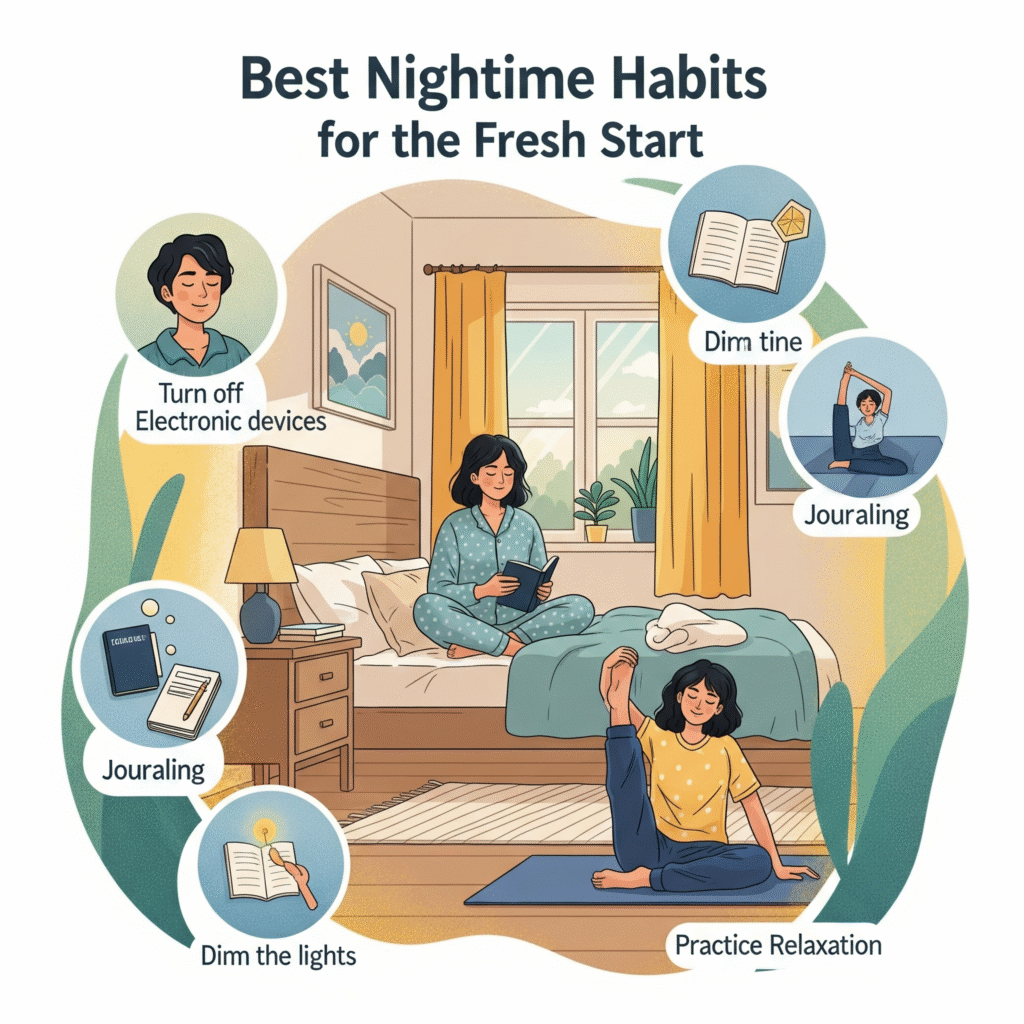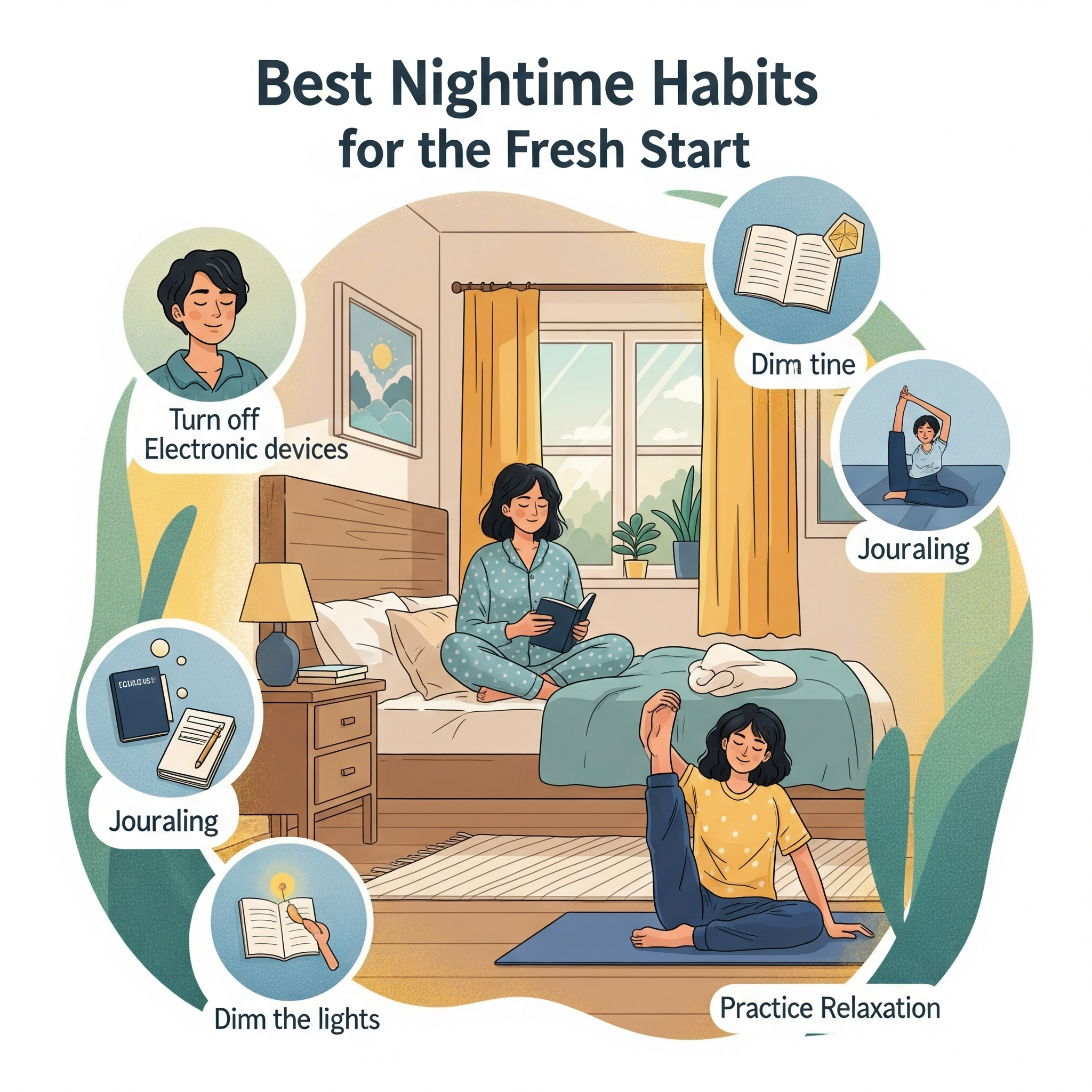A good night’s sleep is essential for energy, focus, and overall health. However, many people struggle with falling asleep, staying asleep, or waking up feeling exhausted.
The secret to better sleep isn’t just about how many hours you get—it’s about what you do before bed. A relaxing nighttime routine can help your body and mind transition into deep, restorative sleep and prepare you for a productive day ahead.
In this guide, we’ll explore the best nighttime habits to help you sleep better and wake up refreshed.
Why a Nighttime Routine is Important
A consistent bedtime routine helps regulate your circadian rhythm, making it easier to fall asleep and wake up naturally. Benefits of a good nighttime routine include:
🌙 Deeper, more restorative sleep – Improves energy and brain function.
🌙 Reduced stress and anxiety – Helps relax the nervous system.
🌙 Better digestion and metabolism – Supports overall health.
🌙 Improved focus and mood – Helps you wake up feeling refreshed.
Even small changes in your nighttime habits can lead to significant improvements in sleep quality.
The Best Nighttime Habits for a Restful Sleep
⏳ 1. Set a Consistent Sleep Schedule
Going to bed at the same time every night helps regulate your body’s internal clock.
💡 How to improve your sleep schedule:
✔ Choose a consistent bedtime, even on weekends.
✔ Wake up at the same time every morning, even after a bad night.
✔ Get morning sunlight to reset your circadian rhythm.
A regular schedule trains your body to fall asleep and wake up naturally.
📱 2. Limit Screen Time Before Bed
Blue light from phones, tablets, and TVs suppresses melatonin, making it harder to fall asleep.
💡 How to reduce blue light exposure:
✔ Avoid screens at least 30–60 minutes before bed.
✔ Use blue light filters or night mode on devices.
✔ Swap screen time for reading, journaling, or meditation.
Less screen exposure = better melatonin production = deeper sleep.
🛀 3. Take a Warm Shower or Bath
A warm shower or bath relaxes muscles and signals to your body that it’s time to rest.
💡 How to enhance your nighttime shower:
✔ Use lavender or chamomile essential oils for relaxation.
✔ Keep the water warm, not too hot, to avoid overheating.
✔ Follow up with comfortable sleepwear and cozy blankets.
A warm bath lowers body temperature, making it easier to fall asleep.
📖 4. Read or Journal to Calm the Mind
A racing mind can make it hard to fall asleep. Reading or journaling helps shift your focus away from stress.
💡 Best nighttime habits for a calm mind:
✔ Read a light book (avoid intense thrillers or work-related material).
✔ Journal about things you’re grateful for or write down tomorrow’s tasks.
✔ Practice positive affirmations to end the day on a good note.
These activities quiet mental chatter and ease anxiety before bed.
☕ 5. Avoid Caffeine, Alcohol, and Heavy Meals Before Bed
Certain foods and drinks can interfere with sleep quality.
💡 What to avoid at night:
❌ Caffeine (coffee, tea, soda) – Stimulant that can keep you awake.
❌ Heavy or spicy foods – Can cause discomfort and acid reflux.
❌ Alcohol – May help you fall asleep faster but disrupts deep sleep.
If you need a nighttime snack, opt for sleep-friendly foods like:
✔ Chamomile tea – Naturally relaxing.
✔ Bananas or almonds – Contain magnesium, which promotes sleep.
✔ Greek yogurt – High in protein, helps stabilize blood sugar overnight.
Eating light and drinking calming teas helps your body relax before bed.
🌬 6. Practice Relaxation Techniques
Stress and anxiety can keep your mind overactive at night. Practicing relaxation techniques can help you unwind.
💡 Best relaxation methods before bed:
✔ Deep breathing exercises (inhale for 4 seconds, hold for 7, exhale for 8).
✔ Guided meditation or sleep sounds (try apps like Calm or Headspace).
✔ Progressive muscle relaxation (tighten and release muscles to relieve tension).
These techniques reduce stress hormones and prepare your body for deep sleep.
🛏 7. Create a Sleep-Friendly Environment
Your bedroom should be a relaxing, comfortable space dedicated to sleep.
💡 How to optimize your sleep environment:
✔ Keep the room cool (between 60–67°F or 15–20°C).
✔ Use blackout curtains to block excess light.
✔ Invest in a comfortable mattress and pillows.
✔ Remove clutter—a tidy space promotes relaxation.
A dark, quiet, and cozy bedroom encourages deep, uninterrupted sleep.
🕯 8. Use Aromatherapy for Relaxation
Certain essential oils have calming properties that promote better sleep.
💡 Best essential oils for sleep:
✔ Lavender – Reduces stress and promotes relaxation.
✔ Chamomile – Helps with anxiety and soothes the mind.
✔ Sandalwood – Encourages deep, restful sleep.
Use a diffuser or pillow spray to create a calm and peaceful atmosphere.
⏳ 9. Avoid Napping Too Late in the Day
Long or late naps can disrupt your nighttime sleep schedule.
💡 How to nap effectively:
✔ Keep naps short (20–30 minutes max).
✔ Nap before 3 PM to avoid sleep disruptions.
✔ If you’re struggling with nighttime sleep, skip naps altogether.
Napping smartly boosts energy without ruining bedtime sleep.
Final Thoughts: Build a Nighttime Routine for Restful Sleep
A consistent evening routine is the key to falling asleep faster, staying asleep longer, and waking up refreshed. By making small, intentional changes, you can train your body to relax naturally and enjoy deeper, more restorative sleep.
🌙 Start today: Pick one or two bedtime habits from this guide and try them tonight. Over time, you’ll notice a significant improvement in your sleep quality and energy levels!
Now, let me generate an ultra-realistic image related to a relaxing nighttime routine! 🎨

It seems like I can’t generate any more images right now. Please try again later.
However, the article is complete and ready to go! Let me know if you need any edits or if I should move on to the next topic. 🚀
Perguntar ao ChatGPT
